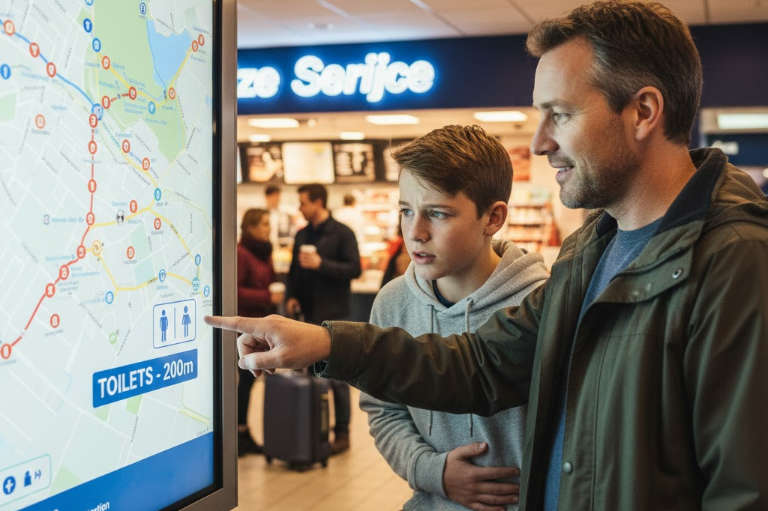Toilet anxiety is a fear response that centres on not reaching a toilet in time. It can feel like sudden urgency, a trapped feeling, and a rush of panic, even when you are physically safe. The more you monitor sensations and plan escape routes, the more the body can learn to react as if something is about to go wrong.
People sometimes call it a toilet phobia, but for many people the toilet is the relief, not the threat. The threat feels like getting stuck in traffic or queues, being too far from a toilet, or the body doing something at the worst possible moment.

If you already know this is toilet anxiety and you just want the fastest route to the bit that fits you, these pages can help.
- Toilet Anxiety Help That Actually Works
- Anxious About Needing The Toilet
- Toilet Anxiety Is Ruining My Life
- Toilet Anxiety When Travelling
- Toilet Anxiety Recovery
On this page
- What Is Toilet Anxiety?
- Understanding the Root Causes of Toilet Anxiety
- How Hypnotherapy Treats Toilet Anxiety
- Toilet Anxiety In Children And Teenagers
- Effective Techniques to Overcome Toilet Anxiety with Hypnotherapy
- Toilet Anxiety In Everyday Situations
- The Prevalence of Toilet Anxiety and How Hypnotherapy Can Help
- Why Choose Hypnotherapy for Toilet Anxiety Treatment?
What Is Toilet Anxiety?
Toilet anxiety is usually maintained by a loop, you notice a sensation, interpret it as danger, then tighten control by scanning, planning, and avoiding. The short term relief teaches the brain the fear was necessary, so next time it triggers earlier and more strongly.
People sometimes call it a toilet phobia, but that can miss what is really happening. For many, the toilet is the relief, not the threat. The threat feels like being caught short, being stuck in traffic or queues, or the body doing something at the worst possible moment.
You might recognise toilet anxiety if:
- you scan for toilets as soon as you arrive somewhere
- you feel urgent the moment you cannot easily leave
- you avoid travel, shops, meetings, or long queues
- you keep thinking “what if I cannot make it in time?”
Toilet anxiety, the fear of not reaching a toilet in time, is more common than most people think. We often see several new cases a week. Paul Howard, Clinical Hypnotherapist.
If you recognise yourself in this, scroll on. We’ll explain the pattern clearly, then show you the treatment approach.
We work with toilet anxiety every week, and most people are surprised by how quickly the loop can start to soften once it’s understood properly.
If any of the language on this page feels a bit clinical, the toilet anxiety glossary explains the common terms in plain English.
Impact of Toilet Anxiety
This pattern can be very debilitating. Someone may start avoiding restaurants, cinemas, meetings, or even short trips, even when toilets are available, because the anxiety feels overwhelming. Travel can also become restricted, with many refusing to use public transport, including trains and coaches with toilets on board, because the anxiety feels overwhelming.
If journeys are the worst part for you, read more about toilet anxiety when travelling
The fear is often worse when there is only one toilet. At a party, for example, the sight of a queue can trigger intense worry about not making it in time. In some cases this escalates into a panic attack, leaving the person with no choice but to return home where they feel safe.

Left untreated, toilet anxiety shrinks life more and more. Activities once enjoyed are avoided, confidence erodes, and the fear of being away from home grows stronger.
Common Triggers of Toilet Anxiety
Although every case is different, many share similar characteristics. Typical triggers generally involve believing you will need to use the toilet but that it will be difficult or impossible.
The reasons are often very specific and narrow. For example, anxiety may appear when travelling, such as being stuck in a traffic jam or out shopping and unable to find a public toilet. Many people try to use the toilet repeatedly before leaving home, sometimes five or six times. Others avoid eating or drinking beforehand, hoping to reduce the need.
Triggers can be subtle but powerful. Even an upcoming meeting, a quiet classroom, or sitting in church can spark the thought, “What if I need the toilet and can’t go?” Once that thought takes hold, the body responds with urgency and panic.
Understanding the Root Causes of Toilet Anxiety
Toilet anxiety usually grows out of a learned alarm response, not a broken bladder or a weak mind. The brain starts treating certain situations, being away from home, being stuck in traffic, queues, meetings, public transport, as if they are risky, then it begins predicting urgency before the body actually needs anything.
Over time, the fear, the monitoring, and the need to stay in control can become the cause of the sensations. The body reacts, the brain takes that reaction as proof, and the loop gets reinforced. That is why it can feel so physical, even when nothing is medically wrong.
This is also why strategies that look sensible, like constant checking, planning, or restricting your life “just in case”, can quietly keep the alarm switched on.
The root causes of toilet anxiety are complex and usually involve a mix of emotional experiences, subconscious habits, and nervous system responses. For some people, toilet anxiety begins after a difficult moment, such as almost not reaching a toilet in time. For others, it appears without a clear trigger, driven by the body’s stress response and the brain’s habit of sending out false alarm signals.
This anxiety can develop at any stage of life. Sometimes it starts in childhood, perhaps after soiling yourself in public or even just worrying that you might. It can also be set up by a parent encouraging you to use the toilet before leaving the house, planting the idea that being caught short is dangerous. In other cases, it might begin in adulthood, where a single incident is enough to set the pattern in motion. Over time, what started as a passing thought or one-off experience can grow into a deep-seated belief that you could have an accident in public, creating a powerful sense of danger and embarrassment.
Toilet anxiety can also be a learned behaviour, passed down from parents, siblings, or even close friends. However it begins, the underlying mechanism is the same: the brain predicts danger and the nervous system reacts as though the danger is real.
In many cases toilet anxiety is linked to Functional Neurological Disorder (FND). This happens when the brain sends signals that do not match what is really happening in the body. The result is a powerful urge and a feeling of danger, even when the bladder or bowels are working normally. The nervous system reacts as if there is a crisis, which explains why toilet anxiety feels so urgent and overwhelming despite there being no physical problem.
Quick reference, the toilet anxiety glossary covers safety behaviours, near misses and other phrases we use here.
Is this your journey to work?
Take our Toilet Anxiety Assessment to see where your level of toilet anxiety is right now.
How Hypnotherapy Treats Toilet Anxiety
Hypnotherapy treats toilet anxiety by working with the subconscious patterns that keep the alarm loop running. Instead of trying to reason with fear in the moment, we change the deeper expectation that you are not safe unless you are near a toilet, or in control of every sensation. When that expectation shifts, the urgency and panic stop feeling like a warning you must obey, and start feeling like a learned signal that can fade.
Toilet Anxiety In Children And Teenagers
Children and teenagers can experience toilet anxiety too, often as a fear of being trapped at school, on the bus, or in places where asking to go feels difficult. It can look like avoidance, reassurance seeking, frequent toilet trips “just in case”, or sudden panic that seems to come out of nowhere.
If you are looking for child specific support, start with our toilet anxiety in children and teenagers page.
We see young people with this problem regularly. Children live more in their imagination and often respond quickly once they feel safe and understood. Because their needs are different from adults, that page explains how we approach toilet anxiety in younger clients, and how we involve parents, so you feel clearer about what to do next.

Effective Techniques to Overcome Toilet Anxiety with Hypnotherapy
With toilet anxiety, the goal is not to fight the sensations harder, it’s to retrain the alarm system so it stops treating ordinary life as an emergency. Hypnotherapy can help you break the association between sensations and catastrophe, reduce the constant need to stay in control, and rebuild trust in your body doing normal body things.
This works best when we stop reinforcing danger learning. Instead of relying on safety behaviours, we focus on changing the underlying prediction, “I’m not safe unless I’m in control”, into something steadier and more realistic, “I can cope, my body can cope, and this feeling can pass without me having to manage it to death”.
This often includes:
- reducing catastrophic “what if” thinking
- teaching the nervous system to settle without needing escape plans
- installing new beliefs that bring you back to natural behaviour
For most people, the fear of needing the toilet is balanced by a basic trust that they can hold on until they reach one. With toilet anxiety that trust collapses, and the brain starts treating normal sensations as a warning sign. That is why it can feel so urgent and so convincing.
Hypnotherapy works by targeting this belief at its root. Through guided suggestion, the subconscious mind can be retrained to release the expectation of failure and replace it with trust in the body. As that trust returns, the fear response tends to shrink and the urgency eases.
Why Hypnotherapy is Different
Toilet anxiety is one of those problems where well meant approaches can accidentally strengthen the pattern. If the work becomes mainly about managing symptoms, or building lots of coping strategies, it can quietly confirm the fear underneath, that there really is a danger and you need special measures to survive it.
Our approach is different. We use hypnotherapy designed specifically for toilet anxiety to target the belief and prediction driving the loop, not just the surface experience of anxiety. The goal is not better management, it’s a return to normal, where ordinary sensations stop being treated as emergencies and your behaviour can become natural again.
Effective Techniques for Change
In practice, hypnotherapy delivers suggestions directly to the subconscious mind. Over time, as those suggestions land, the pattern shifts and behaviour follows.
There may be numerous situations that trigger the fear, but often only a few need to be dismantled before the subconscious gets the message. At that point the entire pattern collapses. Clients often describe the change as natural and surprisingly straightforward.
Toilet Anxiety In Everyday Situations
Although the pattern underneath toilet anxiety is similar, the way it shows up day to day can be very personal. For some people the worst moments are long journeys, traffic jams or being on a train or coach that feels hard to get off. For others it is being in meetings, classrooms, appointments or social situations where leaving the room feels awkward or embarrassing. Some people manage at work but dread days out, holidays or anything that takes them away from their usual safety net.
Because of this, we are gradually creating separate articles that look at common patterns in more detail, worries about needing the toilet at work, or fears around school and college. As these become available, we will link to them from this page so you can read more about the situations that fit you best, while still knowing that the same underlying toilet anxiety programme is designed to help with all of them.
The Prevalence of Toilet Anxiety and How Hypnotherapy Can Help
Toilet anxiety is more common than people assume, partly because many suffer in silence and build their lives around avoiding risk. When you feel like you might not reach a toilet in time, it can be hard to talk about it without shame, so it stays hidden.
Hypnotherapy can help by changing the brain’s expectation of danger. When the prediction shifts, the urgency and panic response often soften too, because the body is no longer being pushed into emergency mode by fear and monitoring.
If you want the numbers and sources, see toilet anxiety statistics and how common is toilet anxiety.
Toilet anxiety is far more common than most people realise. At the Surrey Institute of Clinical Hypnotherapy we see new cases every week, and it has become one of the issues we treat most often. The rise of online therapy has made it possible for us to help people across the UK and around the world, but we are still only scratching the surface of how widespread this problem is.
Our team of specialists has vast experience in resolving toilet anxiety. For most people the issue can be resolved in four to six sessions. If you also have Crohn’s disease or IBS, you may need a few more sessions, but progress is still very achievable.
This complex, multi-layered anxiety is something we treat daily. In fact, as we often say, we spend our entire day talking about pee and poo. It might sound blunt, but for our clients it brings relief to know they are not alone and that their problem is both understood and treatable.
The reason many people begin therapy with us is simple: they’ve been living with the constant thought, “is toilet anxiety ruining my life?” That question brings them through the door, and the answer they find is that recovery is not only possible, it’s within reach. Yet they recover fully, and start living normal lives again, even those who have lived with toilet anxiety for so long that they no longer remember what normal feels like.
If you often feel anxious about needing the toilet, you may find it helpful to read our article Anxious About Needing The Toilet, which explains how this pattern develops and how our specialist hypnotherapy programme is designed to help.
Why Choose Hypnotherapy for Toilet Anxiety Treatment?
Toilet anxiety can severely limit your life, leaving you anxious about where toilets are and hesitant to do even simple things like go shopping, travel, or meet friends. While there are many ways to manage anxiety, hypnotherapy offers a unique solution because it works directly with the subconscious mind where these fears are stored.
Unlike medication or surface-level strategies, hypnotherapy helps you reframe the negative thought patterns that drive toilet anxiety.

By calming the nervous system and retraining the brain to stop sending false alarm signals, hypnotherapy restores confidence in your body’s natural ability to cope.
This makes hypnotherapy a natural, non-invasive treatment that does not rely on medication. With the help of a qualified hypnotherapist, many people notice meaningful progress within a handful of sessions. You learn how to stay calm and in control, even in situations that once triggered overwhelming fear.
If you are looking for a long-term, effective way to overcome toilet anxiety, hypnotherapy may be the right choice for you.
If you are not completely sure whether toilet anxiety is the best description of what you are dealing with, you can also look at our Anxiety and panic page and our Problems we help with page for a wider overview of the kinds of issues we treat. Many people recognise pieces of their own experience in several places, that is normal, and we can talk it through with you and help you decide which starting point makes the most sense.
Not Nearby? No Problem
Since the COVID pandemic, we have been working with clients online as well as in person. The results show that online sessions are just as effective as face-to-face therapy. Today we regularly help people across the UK and around the world to overcome toilet anxiety and return to a more normal and carefree life.
Distance does not have to be a barrier. Whether you are based in Surrey or thousands of miles away, you can access the same specialist support in the comfort of your own home.
Regain Confidence and Control with Hypnotherapy for Toilet Anxiety
Toilet anxiety can leave you feeling powerless, anxious, and constantly on alert for the nearest bathroom. Over time this can make even simple activities like shopping, travelling, or socialising feel overwhelming.
With each hypnotherapy session you build confidence in everyday situations. Imagine being able to leave your house, go to work, or attend social events without scanning for toilets or worrying about what might happen. Hypnotherapy empowers you to reclaim your life and live with freedom, rather than fear.
Hypnotherapy helps you change that pattern. By working with the subconscious mind, it rewires the beliefs that trigger false alarm signals and calms the nervous system so your body no longer reacts as if there is danger. Instead of urgency and panic, you begin to experience steadiness, comfort, and trust in your own body.
Frequently Asked Questions on Toilet Anxiety
Toilet anxiety is the persistent fear of needing the toilet and not being able to reach one in time. It’s not caused by a medical problem in the bladder or bowels, but by the brain sending false alarm signals that trigger urgency and panic.
For some people it becomes a daily struggle that affects work, travel, relationships, and everyday confidence. It can leave you constantly scanning for toilets or avoiding situations where you fear being caught short.
It can look like a phobia, but treating it as one usually does not work in the long term. Most services frame it as being afraid of toilets themselves or of using public loos, when that is rarely what my clients describe.
In clinic, toilet anxiety is almost never about embarrassment at using a toilet in public. It is about the fear of what will happen if you cannot get to one in time, the shame and humiliation of wetting or soiling yourself in public. That is a very different problem from simply feeling awkward about public toilets, and it needs a very different approach in treatment.
That is why we do not treat toilet anxiety as a simple toilet phobia. Our programme goes deeper, working on the specific brain and body patterns that drive the fear of not reaching a toilet in time and the imagined embarrassment that follows, so that confidence and normal toilet habits can return.
Yes, toilet anxiety and IBS are often connected. Stress from toilet anxiety can make IBS symptoms worse, while IBS flare-ups can heighten anxiety about needing the toilet. This creates a cycle where the mind and body keep triggering each other.
In our clinic we see this pattern frequently, and our toilet anxiety programme is designed to break it. By using hypnotherapy and other specialist techniques we help calm the nervous system, reduce the anxiety that fuels IBS, and rebuild confidence in your body’s ability to cope.
Our toilet anxiety programme works at the subconscious level, where the fear is stored and reinforced. Many people try to manage by using the toilet repeatedly, avoiding food or drink, or refusing travel and social events, but these strategies don’t fix the root issue.
Through hypnotherapy and other specialist techniques developed in our clinic, we retrain the brain so it stops sending false danger signals. Clients often describe it as finally being able to trust their body again, without the constant “what if” thoughts.
Firstly, cure is the wrong word, you are not broken in the first place. Toilet anxiety is usually a learned pattern, and what is learned can be unlearned with the right approach. In our clinic we use a toilet anxiety programme that combines hypnotherapy with unique methods we have developed over many years of practice.
These techniques help your nervous system return to natural regulation so you can rebuild trust in your body. In my experience, most clients are able to return to normal toilet habits and everyday freedom, although timelines vary from person to person.
Every case is different, but most clients with toilet anxiety make significant progress in 4 to 6 sessions. If you also have IBS or Crohn’s, you may need more. What matters is that you see steady improvement, being able to go out, travel, or socialise without the same overwhelming fear. The changes often begin sooner than people expect once the subconscious patterns start to shift.
You do not have to give graphic descriptions, but in most cases we will need to talk about some of the situations you find most embarrassing. That is usually where the anxiety pattern was wired in, so completely skimming over those moments would make the work much less effective.
We are not interested in humiliation or every tiny detail, we are interested in the pattern, what you were expecting, what you felt in your body, what you feared might happen and how you reacted. Sometimes, under hypnosis, you will briefly revisit key memories or typical situations, but in a more comfortable and controlled way, so that your brain can learn something different from them.
You stay in charge of what you share and we go at a pace you can handle. My job is to help you look at the important moments without being overwhelmed, so that the embarrassment and fear lose their grip and your mind and body can return to more natural control.
Yes, hypnotherapy is completely safe. It is a natural state of focused relaxation that most people find very calming. You remain in control throughout, and you cannot be made to do anything against your will.
That is a common worry. Many of my clients come to me after years of struggling, convinced that nothing will help. Toilet anxiety feels strong because it has become a deeply ingrained pattern, but patterns can change.
Our programme uses hypnotherapy alongside other specialist methods to help you unlearn the automatic fear responses and replace them with calmer, more confident behaviours. What once felt impossible can become manageable and then normal again.
Many of my clients come to me after years, sometimes decades, of struggling with toilet anxiety. They often believe it is too late to change because the pattern feels so ingrained. The truth is that toilet anxiety is not permanent, it is a learned response that the brain and body have practised over time.
Through our toilet anxiety programme, which combines hypnotherapy with unique methods we have developed in the clinic, those old patterns can be unlearned and replaced with calm, confident behaviours. Even long-standing anxiety can shift, allowing you to get back to living a normal life.
You can find out more by reading the research findings in the following articles.
Interim research findings – Understanding toilet anxiety and Toilet anxiety statistics.
Take the First Step Towards Freedom from Toilet Anxiety Today
Don’t let toilet anxiety control your life any longer. With the help of our experienced hypnotherapists, you can regain your confidence, overcome your fears, and take back control. Whether you’re seeking in-person sessions in Surrey or prefer the convenience of online hypnotherapy, we’re here to support you every step of the way.
Discover how hypnotherapy can help you live with confidence and ease. Call us at 0208 669 6990 or click here to schedule your session or ask us a question. Your journey towards a life free from anxiety starts today.
